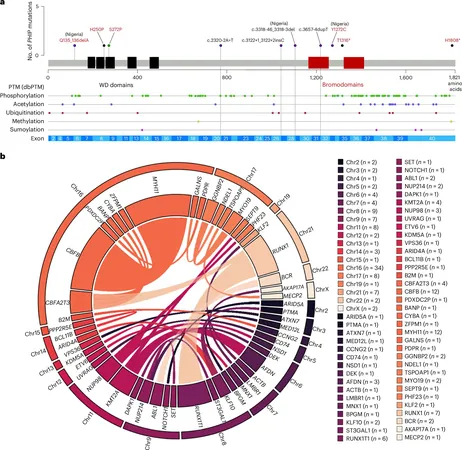
Breakthrough Study Unveils Genetic Key to Improving Survival for Black Patients with Acute Myeloid Leukemia
2024-10-11
Author: Siti
Groundbreaking Study on Survival Rates for Black Patients with AML
In a groundbreaking global study, researchers have identified crucial genetic factors that significantly influence survival rates among Black patients diagnosed with acute myeloid leukemia (AML). This research indicates the urgent need to adjust existing AML risk assessments to incorporate ancestry-specific genetic traits, with a strong call for clinical trials to validate these modifications.
Published in *Nature Genetics*, the study is spearheaded by Dr. Ann-Kathrin Eisfeld, MD, who leads the Clara D. Bloomfield Center for Leukemia Outcomes Research at The Ohio State University Comprehensive Cancer Center, along with Dr. Elaine Mardis, Ph.D., co-leader of the Translational Therapeutics Program at the same institution.
The Urgency of Diversity in Clinical Research
Despite years of genomic research aimed at classifying AML subtypes, a glaring shortfall has emerged when it comes to studying the genomic profiles of diverse patient populations. This oversight has perpetuated notable survival disparities among those affected by AML. As Eisfeld asserts, 'Our study underscores the pressing need for diversity in clinical research and biobanking. Embracing inclusivity in our efforts promises significant advancements in patient care across all demographics.'
Alarmingly, the study reveals that Black patients represent a minuscule 2% of participants in cancer genomics studies, despite comprising approximately 9% of AML cases. This imbalance not only skews data but also hampers the effective application of molecular medicine, thereby leading to potential undertreatment. Analysis indicates that Black patients with AML have consistently poorer outcomes compared to their white counterparts.
Genetic Insights and Differences in AML Outcomes
The findings illustrate that the frequency and impact of genetic mutations differ between Black and white patients diagnosed with AML. 'Our results highlight the critical role that genomics plays in understanding the ancestry-specific factors influencing cancer severity and outcomes,' explained Dr. Mardis. 'For our findings to influence practice, we need extensive genomic profiling of more Black AML samples. A definitive clinical trial will ultimately be necessary to reshape AML risk stratification based on genetic ancestry.'
The methodology involved comparing genetic mutation frequencies between 100 Black AML patients and 323 white patients. The researchers discovered that approximately 73% of the gene mutations observed in Black patients were either unique to them or undetected in white patients. Notably, mutations in the NPM1 and NRAS genes were linked to poorer disease-free survival, while changes in the IDH1 and IDH2 genes were associated with lower overall survival rates. The study also revealed marked differences in inflammatory profiles and gene expression patterns between the two groups.
Implications for Future Research and Patient Care
Incorporating these ancestry-specific mutations into the established genetic risk stratification frameworks could enhance predictive outcomes for Black patients, as changed risk group assignments were observed in one-third of the participants when integrating their unique genetic markers.
Dr. Electra Paskett, Ph.D., a leading figure in cancer health equity at OSUCCC—James, lauded the significance of this research. 'This landmark study illustrates the crucial role diverse participation plays in genomic research, paving the way for a more equitable assessment of cancer outcomes across all races,' she noted.
As the researchers look forward, they are optimistic that their expansive study on African ancestry AML patients will set a standard for future genomic efforts. They emphasize, 'Addressing the current lack of representation among historically marginalized groups in medical studies is essential for enhancing the quality of care and deepening our understanding of AML’s biological underpinnings.'
Conclusion and Future Directions
With this landmark research, the scientific community is challenged to harness the potential of genetically-informed treatment approaches, ensuring that all patients, regardless of their ancestry, receive the best possible care in their battle against acute myeloid leukemia. Stay tuned for more updates on this vital area of cancer research!




 Brasil (PT)
Brasil (PT)
 Canada (EN)
Canada (EN)
 Chile (ES)
Chile (ES)
 España (ES)
España (ES)
 France (FR)
France (FR)
 Hong Kong (EN)
Hong Kong (EN)
 Italia (IT)
Italia (IT)
 日本 (JA)
日本 (JA)
 Magyarország (HU)
Magyarország (HU)
 Norge (NO)
Norge (NO)
 Polska (PL)
Polska (PL)
 Schweiz (DE)
Schweiz (DE)
 Singapore (EN)
Singapore (EN)
 Sverige (SV)
Sverige (SV)
 Suomi (FI)
Suomi (FI)
 Türkiye (TR)
Türkiye (TR)